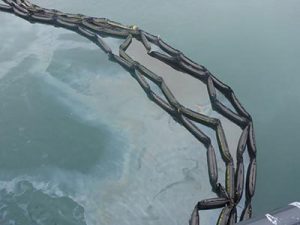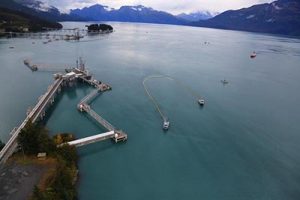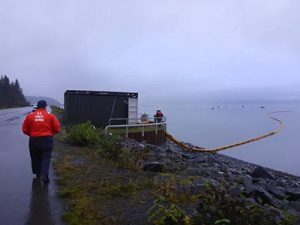
On September 21, approximately 100 gallons of North Slope Crude oil was spilled into Port Valdez. The spill occurred during a planned annual leak-test of the pipes that load oil onto tankers out at the end of loading Berth 5 at the Valdez Marine Terminal.
To conduct the annual test, Alyeska Pipeline Service Company uses the berth’s fire system to pump seawater into the crude piping to a pressure of 190 PSI, or pounds per square inch. That pressure is held for a prescribed amount of time to allow inspectors to visually check the pipes for leaks. However, that day Alyeska was unable to achieve the necessary 190 PSI test pressure and an apparent operational error led to a mixture of crude oil and seawater being spilled into Port Valdez. Alyeska is conducting a thorough investigation of the spill.
Cleaning up
The exact amount of oil spilled is unknown, and will likely remain that way. Spill responders recovered just over 400 gallons of mixed oil and water. To date, Alyeska has measured that approximately 100 gallons of that recovered mixture was crude oil.

Hundreds of personnel responded to the spill, working around the clock, including 13 local fishing vessels that helped collect and clean up the spilled oil.
As a protective measure, responders also deployed boom to deflect oil away from two nearby areas that are particularly sensitive to environmental damage, although no oil came near those locations. Those areas, the Solomon Gulch fish hatchery, and the Duck Flats, a marshy area where waterfowl are concentrated, have special plans known as “geographic response strategies,” containing specific response methods developed ahead of time that are tailored for each unique area. These plans save valuable time during a spill response.
More about geographic response strategies.
Response appropriate for incident
Council staff was on hand throughout the event, monitoring the situation.

“From the Council’s perspective, given mild weather conditions, calm sea state, and extent of the oiling, it appears that overall the response to this spill was appropriate,” said Donna Schantz, executive director for the Council. “Resources were deployed quickly and sensibly, and local environmentally sensitive areas were prioritized for protection.”
“The safety of personnel was also a priority, and no major injuries occurred,” she added. “While this spill was an unfortunate event, the response of Alyeska, ADEC, and USCG has generally been well-coordinated and methodical.”
The Council is currently compiling and evaluating information regarding the cause of the spill, the response, and any environmental impacts that resulted. While no amount of oil spilled to water is acceptable, the Council is taking the opportunity to learn from the event in order to promote measures designed to prevent and respond to oil spills from the terminal in the future.